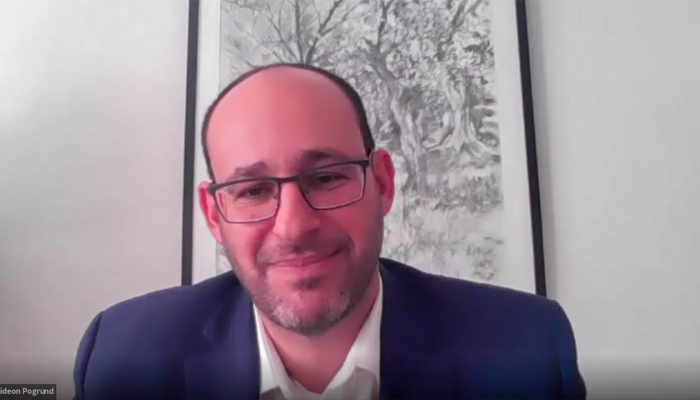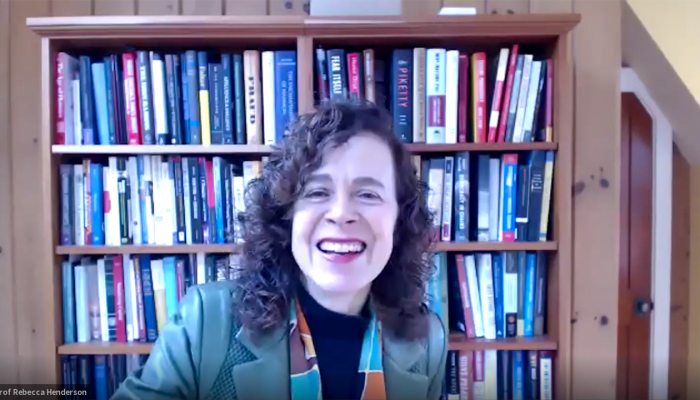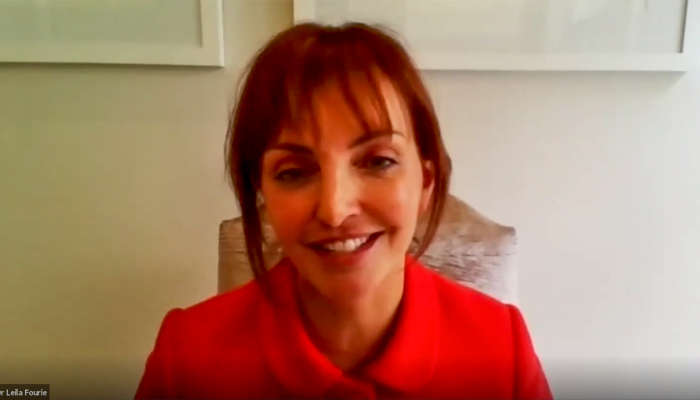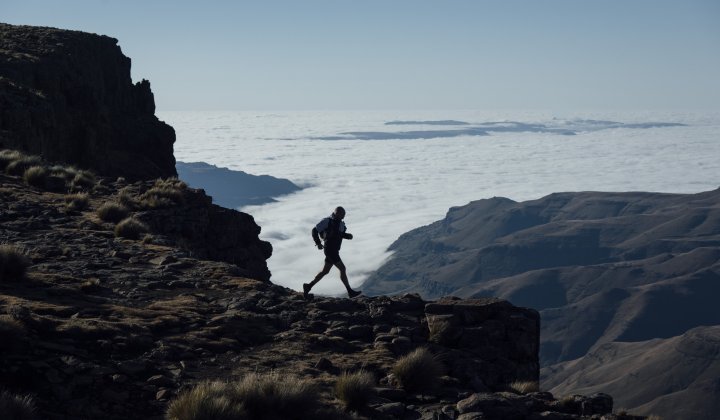Three pressing problems
Henderson’s book, Reimagining Capitalism In A World On Fire, describes a world confronted with three major challenges – environmental degradation, economic inequality, and institutional collapse – and investigates the role of capitalism in addressing these pressing problems. Her participation in the GIBS Flash Forum was her first talk in the African context on the subject, but she says the theme is globally relevant.
Fourie agrees. “If we look at South Africa, food, water and energy security form the basis of a self-sufficient economy, but as a water-scarce country with very little arable land and dependence on oil imports, South Africa is an economy that is testing the limits of its resource constraints,” she says. “If this is not kept in check, we will eventually be unable to support inclusive economic growth.”
She also highlights the country’s high carbon footprint. Its dependence on coal-derived power, together with the jobs tied to this, makes transitioning away from fossil energy genuinely tricky. On the economic front, we have the dubious honour of having the highest Gini coefficient in the world, largely linked to unemployment, particularly among youth. Institutional collapse is something many South Africans are perpetually concerned with.
“The president raised an interesting point in his economic recovery speech, placing emphasis on the link between economic transformation and governance reform,” Fourie says, pointing to the firing of Tom Moyane, former SARS commissioner, as well as funds retrieved by Eskom from McKinsey and investigations into Gupta-linked contracts as examples of progress in this regard.
Where does business fit in?
Should business be responsible for solving these problems? Should it stay in its lane? Henderson believes the answer is somewhere between the two. “Of course, business cannot solve these problems alone, but they cannot be solved without business,” she says.
What business does at its best, she believes, is to generate employment and innovation – both requirements to help the world out of the massive problems facing it. “I don't mean for a moment to say this is easy. But to transition an entire economy off coal and gas into renewables – that's a huge jobs project. That's a lot of work. And I think private firms with the right kinds of incentives and the right kinds of regulation are best positioned to lead that charge.”
The problem with businesses ‘staying in their lane’ is that it won’t be an option forever. “What are you going to do as the society around you becomes less and less capable of buying the goods you produce or giving you the employees you need?” Henderson asks. There’s no longer the option of saying, “Don’t bother me – I’m just making money.”
“We need to rethink what it means to be a business, so that you make money, but you're absolutely engaged in a conversation about how to do that in a way that contributes to the long-term health and security of our society. And I think that's eminently possible,” Henderson says.
Values should underpin investment
Fourie emphasises that the Covid-19 pandemic has caused a reversion to basic values, which is, in turn, affecting investment flows. “As an economist and a capital markets person, I look at the massive increase that we've seen in investment flows into ESG [Environmental, Social, and Corporate Governance]. BlackRock is suggesting that 88% of their indices that are sustainable are doing better than the non-sustainable indices.”
She believes that this crisis has indicated that sustainable companies are more resilient to shocks in the economy. “I think we should jump onto that and we should build on that already very powerful trend that we were seeing in the economy and encourage that.”
She adds that this needs to go hand-in-hand with other critical structural requirements, such as a common framework for measuring ESG and an appropriate system that reads integrity and trust to avoid greenwashing.
Mark as urgent
Henderson believes that action is necessary and urgent because the alternatives of not acting are far worse. “We kid ourselves that if we do nothing, nothing will change. But that is not true,” she says. “I spent six months in Finland, trying to persuade Nokia – once the world's largest cell-phone manufacturer – that Apple was a genuine threat. I could not do it. Life was too comfortable. This is all about understanding that this is urgent. We must change; we must begin the hard work. But it is hard work; it's not instantaneous.”
She stresses that this change must be a team effort. “No single individual can carry this kind of transition and carry all the skills, but a team together can, and a team is supported by colleagues and peers and other firms who are also trying to make the same transition. This needs to be collaborative. Industry by industry, region by region, we have to agree that there are some things we have to do and that there are some ways of behaving that are not acceptable.”
Taking a lead from Lipton tea
Leadership skills are vital in leading this charge, especially strategic vision, Henderson says. Look for the sweet spots to increase employment, create better quality jobs, address the energy transition, and make money. This requires thinking about managing businesses differently, which is easier said than done. But it is doable.
In her book, Henderson cites the example of Michiel Leijne, who joined Unilever in 2006 as the brand development manager for Lipton tea. With the teabag industry suffering from chronic oversupply and lack of product differentiation, the price of tea had decreased to less than half its mid-80s peaks, despite being the most drunk beverage in the world after water, and brands were slashing their prices. Leijne and his team proposed that Unilever commit publicly to purchasing 100% sustainably grown tea. Not only would this mean training over half a million smallholder farms – but it would also mean paying more for tea, in the middle of an ongoing price war.
But Leijne argued that the move would help to secure supply, which was increasingly under threat from global warming, as well as shaky growing practices. He also made a case for protecting Unilever’s tea brands. Given the abject working conditions of many employed in tea-growing and harvesting, Leijne argued that Unilever could open itself to attacks in the media for being seen to support unfair labour practices. The team also suggested that it would be possible to persuade tea suppliers to embrace more sustainable practices. Finally, they argued that openly pursuing sustainability would boost consumer demand for Lipton products. After six months of discussions, Unilever committed to the idea.
By 2015, all the tea in Lipton teabags came from Rainforest Alliance certified estates, and hundreds of thousands of tea workers’ lives had been changed for the better. In markets where the sustainability messaging was enthusiastically embraced in marketing, Unilever’s market share increased significantly. In the UK, sales of PG tips increased by 6% and its market share by 1.8 points. In Australia, Lipton’s market share increased from 24.2% to 25.8% and sales rose by 11%. In Italy, sales increased by 10.5%.
In June 2019, Unilever announced its purpose-led “sustainable living” brands were growing 69% faster than the rest of the business and generating 75% of its growth.
Henderson says this case study demonstrates two pathways for creating shared value: reducing risk and increasing demand. She also underscores that shared value is an innovation – one she refers to as “an architectural innovation”.
Shared value – an architectural innovation
“Architectural innovations change the relationship between the components of a system – the system's architecture – without the components themselves,” Henderson explains. “And because most people in most organisations are focused on the components of the system they're embedded in, rather than the relationship between them, architectural innovations are hard to spot and hard to react to. Architectural knowledge – knowledge of how the components fit together – becomes embedded in the structure, in the incentives, and in the information processing capability of the organisation, where it becomes effectively invisible, making it very difficult to change.”
Whereas much of the conversation around innovation currently focuses on technology, she believes that what will really help business to innovate is these architectural innovations – new ways of thinking about the structure and purpose of firms.
For example, the idea that the way to grow Lipton's tea business was to increase the price it paid for tea was a profoundly revolutionary one, requiring a new way of thinking about the entire value chain.
How to reimagine capitalism
Fourie and Henderson both have several suggestions on how to begin reimagining capitalism.
Fourie notes that there has been a systemic shift in an understanding that the components in our environment are interconnected and urges South Africa to use the lessons of the pandemic. Her suggestions include:
- Focus on public/private partnership, not only to restart the economy but to address our sustainability challenges.
- Leverage the rapid uptake of technology that the pandemic has sparked, to build a more inclusive environment.
- Prioritise connectivity (free Wi-Fi) in informal settlements, so that children learning from home and adults working from home can make a living and grow and develop.
- Create a consistent and globally universal measurement scorecard to accurately compare sustainable development.
- Most importantly, capture hearts and minds to ensure emotional and cultural commitment to transformation, particularly through shifting leaders’ mental frames.
Henderson suggests that reimagining capitalism needs to happen everywhere, and it's easier in many ways for it to happen in everyday parts of the corporation.
“We make it sound as though thinking about both purpose and profit was an unnatural act, but it's not,” she says. “It's unnatural to think that the only goal is to make as much money as possible. Most people think the idea that we should make a decent living but really make a difference to the world around us is completely normal. We've suppressed that. Wherever we are, wherever we stand, we need to begin to look around and say, ‘How can I do that? How can I do both?’.”







